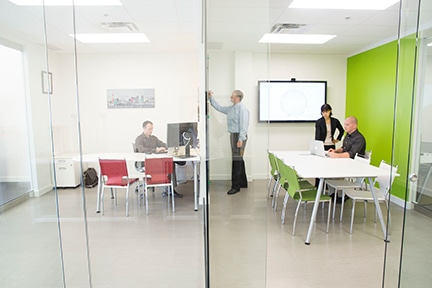Enhanced Productivity
Smart office tools significantly boost workplace productivity.
With the implementation of smart technologies, employees can streamline their tasks and reduce time spent on repetitive activities. Automated systems and intelligent scheduling tools allow individuals to focus on higher-level functions that require critical thinking. Additionally, access to real-time data enables quicker decision-making and improves overall workflow efficiency. This shift not only leads to faster project completion but also promotes a culture of innovation within the organization. Furthermore, the use of collaborative platforms facilitates effective teamwork, ensuring that team members can communicate seamlessly and share resources when needed.
Cost Savings
Investing in smart office technology can lead to substantial cost reductions.
By automating routine processes and optimizing resource use, organizations can lower operational costs significantly. Smart technologies help monitor energy consumption, allowing businesses to identify areas for savings and implement energy-efficient solutions. Furthermore, these technologies can reduce the need for physical office space through remote work capabilities, which can decrease overhead expenses such as rent and utilities. Utilizing cloud services also minimizes the need for expensive IT infrastructure, as maintenance and updates are handled by service providers. Ultimately, the initial investment in smart technology pays off through long-term financial benefits and increased profitability.
Improved Employee Well-being
Smart offices contribute to a healthier and more satisfying work environment.
The incorporation of smart technologies helps create a workplace that caters to employees’ needs, directly impacting their well-being. For example, smart lighting systems can adjust based on individual preferences and natural light availability, enhancing comfort and reducing eye strain. Additionally, wellness applications can promote healthier lifestyles by reminding employees to take breaks and encouraging physical activity. A more comfortable and health-conscious workspace leads to increased job satisfaction and morale, resulting in lower employee turnover. Consequently, businesses benefit from retaining experienced staff and creating a more positive workplace culture.
Increased Flexibility
Smart office technology enables greater workplace flexibility.
As remote work becomes more prevalent, smart office solutions facilitate seamless transitions between in-office and remote settings. Technologies such as virtual conferencing systems and collaboration tools allow teams to connect effortlessly regardless of their physical location. This flexibility not only accommodates a diverse workforce but also empowers employees to work in environments where they feel most productive. Furthermore, adaptable office spaces underpinned by smart technology can be reconfigured easily to suit various team sizes and project needs. By fostering a flexible workplace, organizations can attract diverse talent and adapt more readily to changing business demands.
Enhanced Data Security
Smart office technology provides improved data security measures.
Modern smart office systems incorporate advanced security features that protect sensitive information from unauthorized access. Multi-factor authentication, encryption, and real-time monitoring ensure that data breaches are minimized, and organizations can confidently manage their information assets. Moreover, centralized control systems allow for greater oversight and management of access rights, ensuring only authorized personnel can access specific information. As cyber threats continue to evolve, the robust security protocols implemented through smart technologies help safeguard business operations and maintain client trust. Investing in these solutions is not only prudent but essential in todays digital landscape.
Sustainability and Environmental Impact
Adopting smart office technology contributes to sustainability efforts.
Smart technology plays a critical role in promoting environmentally friendly practices within the workplace. Energy-efficient systems and smart sensors optimize energy use, leading to reduced carbon footprints and lower resource consumption. Furthermore, technology that supports remote work can decrease the need for commuting, further benefiting the environment. Organizations can also leverage data analytics to identify waste and improve recycling efforts. By prioritizing sustainability, businesses can enhance their corporate responsibility profile and appeal to eco-conscious consumers while potentially reaping financial incentives offered for green initiatives.
Better Resource Management
Smart office technology fosters more effective resource management.
These advanced systems provide insights into resource usage, enabling organizations to allocate assets more efficiently. Inventory management tools, for instance, help track supplies in real-time, ensuring that departments do not over-order or run out of essential materials. Furthermore, effective space utilization can be achieved through smart analytics, allowing businesses to optimize floor space and reduce unnecessary expenses. By closely monitoring and managing resources, companies can enhance their operational efficiency and significantly reduce waste. This leads to more informed decision-making regarding future investments in resources and technology.
In summary, the implementation of smart office technology offers a multitude of benefits that drive productivity, reduce costs, and promote employee well-being. As organizations increasingly embrace these innovations, the result is not only a more efficient workplace but also a positive impact on sustainability efforts and business resilience.

